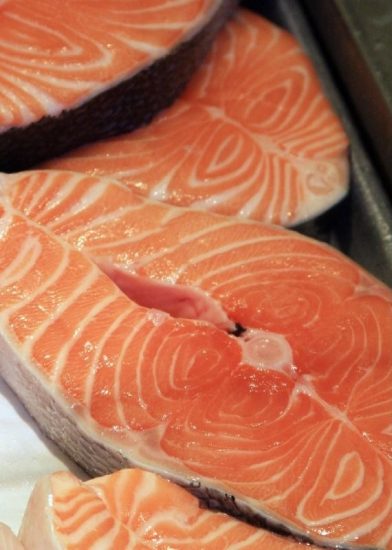



Consuming salmon –choosing between antibiotics and
genetic engineering
When it comes to farmed salmon, the news coming out of the United States isn't
good. For one, large retail chains are
taking farmed salmon off the shelves as the fish have been subject to excessive
amounts of antibiotics. At the same time, genetically modified salmon has just
been approved for sale and consumption to the general public.
The
world's oceans are overfished, and the demand for fish is high, leading to a
boom in the fish farming industry. Fish farming in the oceans, called ocean
aquaculture, is extremely lucrative but competition is great. Here, processes
are streamlined, more fish are cramped into the pens and fish food is “loaded”
with chemicals and hormones to make the fish grow faster and bigger.
Farmed fish subject to intolerable living conditions
To
maximise profits, farm operators try to increase the density of fish – even
going beyond a reasonable level without increasing the space allocation. Not
only does this create distress and intolerable living conditions for the fish,
it also increases the risk of the spread of diseases and parasites.
Chile
is the world's second largest producer of farmed salmon. In 2008, to fight and
prevent disease in their fish stocks, Chilean farmers used almost 350 times
more antibiotics than Norway, the world's largest producer.
Although
using antibiotics to fatten animals is not new, it carries the risk of
developing antibiotic-resistant bacteria in both the animals and the people who
subsequently consume them. Large retail chains in the US have acknowledged the
dangers and have taken the antibiotic-treated salmon from their stores, either
partially or completely.
However, on a related
matter, we now have the ability to modify salmon through genetic engineering.
The US Food and Drug Administration has recently approved a genetically
engineered salmon as fit for public sale and consumption – without any legal
requirement for it to be labelled as such. Called AquAdvantage Salmon, this
salmon grows faster and larger than normal salmon; there is already strong
opposition against it in the United States, from environmental groups as well
as conventional fish farmers. Labelled by some as “Frankenfish”, the fish is
the first genetically modified animal in the US to be deemed fit for human
consumption.
The
company responsible for the fish, AquaBounty Technologies from Massachusetts,
currently raises the AquAdvantage Salmon in Panama using fish eggs from Canada.
Opponents have expressed fears that the fish may escape into the wild and
multiply.
For
now, the question of whether and when AquAdvantage Salmon would eventually find
its way on the consumers' plate is uncertain. In any case, the import of
genetically modified foods is one of the issues on the agenda in the planned
Transatlantic Trade and Investment Partnership between the EU and the US.
Perils of fish farming in the ocean
A
danger of ocean aquaculture comes about if the farmed fish escape; they carry
with them diseases, parasites and genetic abnormalities resulting from the
stress of living in confined spaces and being fed with antibiotic- and
hormone-laden feed. There is also evidence of sea lice that have grown
resistant to traditional antibiotics, developing into “super lice” that can
infect both the captive and wild fish populations.
 Mares
Mares 30th November 2015
30th November 2015 United States
United States